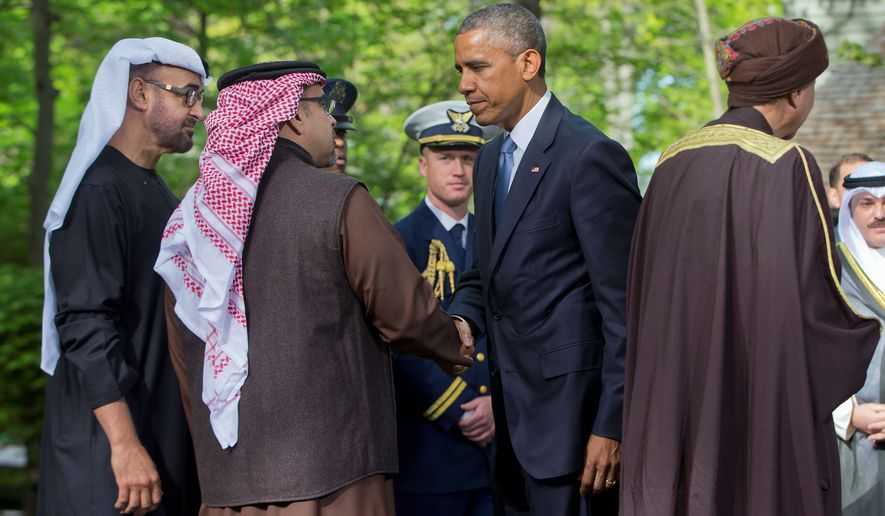Just hours after Congress cemented its authority to review any nuclear deal with Iran, President Obama said Thursday the U.S. and its Gulf allies are unified in their effort to not only stop Tehran from acquiring nuclear weapons but also to transform the nation from regional troublemaker to peaceful neighbor.
At a rare high-level summit at Camp David, Mr. Obama met with leaders from the six nations comprising the Gulf Cooperation Council (GCC) — Saudi Arabia, Oman, the United Arab Emirates, Kuwait, Qatar and Bahrain — and emerged sounding confident that Arab leaders are on board with the U.S.-led effort to halt Iran’s nuclear program.
“What I did hear from our GCC partners was their agreement that if we can get a comprehensive, verifiable deal that cuts off the pathways to a nuclear weapon, that that would be in their interests and the interests of the region, as well as the world community,” the president said at a press conference at the conclusion of the two-day summit. “And so the question is then going to be: Is Iran prepared to do what’s required for the international community to feel confidence that, in fact, it’s not developing a nuclear weapon? And have we set up the kinds of inspection regimes that allow such confidence to be maintained not just next year or five years from now, but out into the future?”
The president also said that the U.S. and the GCC welcome an Iran that embodies “peace and good neighborliness” toward other countries in the region.
The U.S. and its allies in the P5 plus 1 — Britain, France, Germany, Russia and China — have until June 30 to strike a final nuclear deal with Iran. Tehran already has agreed to limit aspects of its nuclear program in exchange for relief from some economic sanctions, but the details of how much sanctions relief will be offered and when it would go into effect have yet to be hammered out.
But there are deep concerns both in the U.S. and abroad that the draft nuclear deal doesn’t address Iran’s support for terrorism, or other destabilizing activities in the region. Mr. Obama acknowledged that GCC leaders fear Iran may use new money from sanctions relief to bolster its support for terrorism.
SEE ALSO: Israeli ambassador warns Washington against Iran nuclear deal risks
Those fears are just one reason why lawmakers on Capitol Hill have insisted that they have the chance to review any deal with Iran before it’s finalized, and the House on Thursday overwhelmingly passed legislation granting Congress authority to study the deal before it is implemented.
The bill, which cleared the chamber by a vote of 400-25 and has already passed the Senate, gives Congress 30 days to review a final agreement with Tehran and prevents the president from lifting any economic sanctions during that period.
“It is both ridiculous and insulting that the president wants to bind our country to an agreement without even consulting the people’s elected representatives, especially since so many are concerned about the terms of a proposed deal,” House Majority Leader Kevin McCarthy, California Republican, said in a statement. “Today’s legislation is a minimum. The president should take it as a message from Congress that, as the negotiations go forward, the administration must insist on major improvements to what is currently a dangerous initial understanding with Iran.”
Despite virtually no public distance between Mr. Obama and the GCC this week, some analysts say Gulf nations remain troubled by the Iran deal.
Gulf leaders likely are hesitant to express those reservations publicly and instead voiced their concerns by simply not showing up to the summit, said Jim Phillips, a senior research fellow for Middle Eastern affairs at the conservative Heritage Foundation.
Saudi Arabia’s King Salman and Bahrain’s King Hamad bin Isa Al Khalifa joined the leaders of Oman and the United Arab Emirates in declining to attend.
SEE ALSO: Obama pressed to raise human-rights abuses in Gulf nations
“Unlike [Israeli] Prime Minister Netanyahu, who was very direct in criticizing the administration, the Gulf Arabs are more reluctant to publicly differ with the administration, and I think the decision by King Salman and King Hamad reflects a vote of no-confidence in the administration,” Mr. Phillips said. “They’re extremely alarmed by the naive and risky strategy the administration has adopted in the nuclear negotiations and they fear that a nuclear deal would encourage an improvement of U.S.-Iranian bilateral relations that would undermine their own security.”
In addition to Iran, the U.S. and the Gulf Arab states also said they will deepen military and security cooperation. Mr. Obama said the U.S. will conduct more military exercises in the region, will provide greater military and counterterrorism training and will help the GCC develop a broad missile-defense system.
• Ben Wolfgang can be reached at bwolfgang@washingtontimes.com.




Please read our comment policy before commenting.